Disinformation in the Digital Age: Climate Change, Media Dynamics, and Strategies for Resilience
Abstract
1. Introduction
2. Methods
2.1. Literature Review
2.1.1. Identification
2.1.2. Screening
2.1.3. Eligibility
2.1.4. Inclusion
2.2. Classification and Clustering
3. Results
4. Discussion
4.1. Interpretation of Key Findings
4.2. Comparison with Previous Studies
4.3. Practical Implications
5. Conclusions
Author Contributions
Funding
Informed Consent Statement
Data Availability Statement
Acknowledgments
Conflicts of Interest
Appendix A. Overview of Clusters with Related Papers
| Disinformation and misinformation | |
| 1 | doc1: Smyth S.J.–Charlebois S., Agricultural chemical use and the rural-urban divide in Canada, GM Crops and Food, 2024; |
| 2 | doc2: Rauscher N., American Philanthropy in the Age of Political Polarization: Conservative Megadonors and Foundations and Their Role in Spreading Climate Skepticism, Politische Vierteljahresschrift, 2024; |
| 3 | doc7: Thapa Magar N.–Thapa B.J.–Li Y., Climate Change Misinformation in the United States: An Actor–Network Analysis, Journalism and Media, 2024; |
| 4 | doc8: Chen L., Combatting Climate Change Misinformation: Current Strategies and Future Directions, Environmental Communication, 2024; |
| 5 | doc9: Christner C.–Merz P. et al., Combatting Climate Disinformation: Comparing the Effectiveness of Correction Placement and Type, Environmental Communication, 2024; |
| 6 | doc16: de Nadal L., From Denial to the Culture Wars: A Study of Climate Misinformation on YouTube, Environmental Communication, 2024; |
| 7 | doc25: Spampatti T.–Hahnel U.J.J. et al., Psychological inoculation strategies to fight climate disinformation across 12 countries, Nature Human Behaviour, 2024; |
| 8 | doc55: Freiling I.–Matthes J., Correcting climate change misinformation on social media: Reciprocal relationships between correcting others, anger, and environmental activism, Computers in Human Behavior, 2023; |
| 9 | doc59: Koch T.K.–Frischlich L.–Lermer E., Effects of fact-checking warning labels and social endorsement cues on climate change fake news credibility and engagement on social media, Journal of Applied Social Psychology, 2023; |
| 10 | doc72: Fish C.S.–Kreitzberg K.Q., Mapping in an Echo Chamber: How Cartographic Silence Frames Conservative Media’s Climate Change Denial, Annals of the American Association of Geographers, 2023; |
| 11 | doc83: Jylhä K.M.–Stanley S.K. et al., Science Denial: A Narrative Review and Recommendations for Future Research and Practice, European Psychologist, 2023; |
| 12 | doc95: Cook J.–Ecker U.K.H. et al., The cranky uncle game—combining humor and gamification to build student resilience against climate misinformation, Environmental Education Research, 2023; |
| 13 | doc96: Pop V.–Ozunu A. et al., The influence of media narratives on microplastics risk perception, PeerJ, 2023; |
| 14 | doc105: Green M.–McShane C.J.–Swinbourne A., Active versus passive: evaluating the effectiveness of inoculation techniques in relation to misinformation about climate change, Australian Journal of Psychology, 2022; |
| 15 | doc125: Silva H.M., Information and misinformation about climate change: Lessons from Brazil, Ethics in Science and Environmental Politics, 2022; |
| 16 | doc141: Lai K.–Yang Y. et al., The Relationship between Bullshit Receptivity and Willingness to Share Misinformation about Climate Change: The Moderating Role of Pregnancy †, International Journal of Environmental Research and Public Health, 2022; |
| 17 | doc142: Schmid-Petri H.–Bürger M., The effect of misinformation and inoculation: Replication of an experiment on the effect of false experts in the context of climate change communication, Public Understanding of Science, 2022; |
| 18 | doc146: Cormick C., We Need to Do Better: Five Notable Failings in Science Communication, Sustainability (Switzerland), 2022; |
| 19 | doc149: Lewandowsky S.–Armaos K. et al., When Science Becomes Embroiled in Conflict: Recognizing the Public’s Need for Debate while Combating Conspiracies and Misinformation, Annals of the American Academy of Political and Social Science, 2022; |
| 20 | doc154: Timperley J., Advertising with a conscience, The Lancet Planetary Health, 2021; |
| 21 | doc158: Franta B., Early oil industry disinformation on global warming, Environmental Politics, 2021; |
| 22 | doc164: Compton J.–van der Linden S. et al., Inoculation theory in the post-truth era: Extant findings and new frontiers for contested science, misinformation, and conspiracy theories, Social and Personality Psychology Compass, 2021; |
| 23 | doc172: Supran G.–Oreskes N., Rhetoric and frame analysis of ExxonMobil’s climate change communications, One Earth, 2021; |
| 24 | doc198: Pop M.-I., Scoring Model for the Detection of Fake News, Studia Universitatis Vasile Goldis Arad, Economics Series, 2020; |
| 25 | doc204: Porter E.–Wood T.J.–Bahador B., Can presidential misinformation on climate change be corrected? Evidence from Internet and phone experiments, Research and Politics, 2019; |
| 26 | doc212: Farrell J., The growth of climate change misinformation in US philanthropy: Evidence from natural language processing, Environmental Research Letters, 2019; |
| 27 | doc216: Cook J.–Ellerton P.–Kinkead D., Deconstructing climate misinformation to identify reasoning errors, Environmental Research Letters, 2018; |
| 28 | doc219: Marshall J.P., Psycho-social disruption, information disorder, and the politics of wind farming, Energy Research and Social Science, 2018; |
| 29 | doc223: van der Linden S.–Leiserowitz A. et al., Inoculating the Public against Misinformation about Climate Change, Global Challenges, 2017; |
| 30 | doc224: Cook J.–Lewandowsky S.–Ecker U.K.H., Neutralizing misinformation through inoculation: Exposing misleading argumentation techniques reduces their influence, PLoS ONE, 2017; |
| 31 | doc230: Williamson P., Take the time and effort to correct misinformation, Nature, 2016; |
| 32 | doc232: Hochschild J.–Einstein K.L., ‘It Isn’t What We Don’t Know that Gives Us Trouble, It’s What We Know that Ain’t So’: Misinformation and Democratic Politics, British Journal of Political Science, 2015; |
| Climate change | |
| 1 | doc2: Rauscher N., American Philanthropy in the Age of Political Polarization: Conservative Megadonors and Foundations and Their Role in Spreading Climate Skepticism, Politische Vierteljahresschrift, 2024; |
| 2 | doc7: Thapa Magar N.–Thapa B.J.–Li Y., Climate Change Misinformation in the United States: An Actor–Network Analysis, Journalism and Media, 2024; |
| 3 | doc8: Chen L., Combatting Climate Change Misinformation: Current Strategies and Future Directions, Environmental Communication, 2024; |
| 4 | doc9: Christner C.–Merz P. et al., Combatting Climate Disinformation: Comparing the Effectiveness of Correction Placement and Type, Environmental Communication, 2024; |
| 5 | doc11: Elroy O.–Komendantova N.–Yosipof A., Cyber-echoes of climate crisis: Unraveling anthropogenic climate change narratives on social media, Current Research in Environmental Sustainability, 2024; |
| 6 | doc16: de Nadal L., From Denial to the Culture Wars: A Study of Climate Misinformation on YouTube, Environmental Communication, 2024; |
| 7 | doc25: Spampatti T.–Hahnel U.J.J. et al., Psychological inoculation strategies to fight climate disinformation across 12 countries, Nature Human Behaviour, 2024; |
| 8 | doc27: Pearson S.–Hornsey M.J. et al., Publicly expressed climate scepticism is greatest in regions with high CO2 emissions, Climatic Change, 2024; |
| 9 | doc32: Kresin S.–Kremer K.–Büssing A.G., Students’ credibility criteria for evaluating scientific information: The case of climate change on social media, Science Education, 2024; |
| 10 | doc34: Mata F.–Dos-Santos M. et al., The Society of Information and the European Citizens’ Perception of Climate Change: Natural or Anthropological Causes, Environmental Management, 2024; |
| 11 | doc35: Finnegan W.–d’Abreu C., The hope wheel: a model to enable hope-based pedagogy in Climate Change Education, Frontiers in Psychology, 2024; |
| 12 | doc37: Gounaridis D.–Newell J.P., The social anatomy of climate change denial in the United States, Scientific Reports, 2024; |
| 13 | doc39: Ejaz W.–Altay S. et al., Trust is key: Determinants of false beliefs about climate change in eight countries, New Media and Society, 2024; |
| 14 | doc51: Holder F.–Mirza S. et al., Climate obstruction and Facebook advertising: how a sample of climate obstruction organizations use social media to disseminate discourses of delay, Climatic Change, 2023; |
| 15 | doc59: Koch T.K.–Frischlich L.–Lermer E., Effects of fact-checking warning labels and social endorsement cues on climate change fake news credibility and engagement on social media, Journal of Applied Social Psychology, 2023; |
| 16 | doc65: Sill T.E.–Ayala J.R. et al., How Climate Literacy and Public Opinion Are the Driving Forces Behind Climate-Based Policy: A Student Perspective on COP27, ACS Omega, 2023; |
| 17 | doc72: Fish C.S.–Kreitzberg K.Q., Mapping in an Echo Chamber: How Cartographic Silence Frames Conservative Media’s Climate Change Denial, Annals of the American Association of Geographers, 2023; |
| 18 | doc84: Fasce A.–Adrián-Ventura J. et al., Science through a tribal lens: A group-based account of polarization over scientific facts, Group Processes and Intergroup Relations, 2023; |
| 19 | doc95: Cook J.–Ecker U.K.H. et al., The cranky uncle game—combining humor and gamification to build student resilience against climate misinformation, Environmental Education Research, 2023; |
| 20 | doc98: Dahlberg L., The language of late fossil capital, Nordic Journal of Media Studies, 2023; |
| 21 | doc105: Green M.–McShane C.J.–Swinbourne A., Active versus passive: evaluating the effectiveness of inoculation techniques in relation to misinformation about climate change, Australian Journal of Psychology, 2022; |
| 22 | doc114: Treen K.–Williams H. et al., Discussion of Climate Change on Reddit: Polarized Discourse or Deliberative Debate?, Environmental Communication, 2022; |
| 23 | doc119: Hassan I.–Musa R.M. et al., Exploring Denial Strategies against Climate Change across Agents and Media Platforms, Online Journal of Communication and Media Technologies, 2022; |
| 24 | doc124: Tillery D.–Bloomfield E.F., Hyperrationality and Rhetorical Constellations in Digital Climate Change Denial: A Multi-Methodological Analysis of the Discourse of Watts up with That, Technical Communication Quarterly, 2022; |
| 25 | doc125: Silva H.M., Information and misinformation about climate change: Lessons from Brazil, Ethics in Science and Environmental Politics, 2022; |
| 26 | doc141: Lai K.–Yang Y. et al., The Relationship between Bullshit Receptivity and Willingness to Share Misinformation about Climate Change: The Moderating Role of Pregnancy †, International Journal of Environmental Research and Public Health, 2022; |
| 27 | doc142: Schmid-Petri H.–Bürger M., The effect of misinformation and inoculation: Replication of an experiment on the effect of false experts in the context of climate change communication, Public Understanding of Science, 2022; |
| 28 | doc147: Morote Á.-F.–Hernández M., What Do School Children Know about Climate Change? A Social Sciences Approach, Social Sciences, 2022; |
| 29 | doc154: Timperley J., Advertising with a conscience, The Lancet Planetary Health, 2021; |
| 30 | doc156: Coan T.G.–Boussalis C. et al., Computer-assisted classification of contrarian claims about climate change, Scientific Reports, 2021; |
| 31 | doc158: Franta B., Early oil industry disinformation on global warming, Environmental Politics, 2021; |
| 32 | doc172: Supran G.–Oreskes N., Rhetoric and frame analysis of ExxonMobil’s climate change communications, One Earth, 2021; |
| 33 | doc175: Duram L.A., Teaching a social science course on climate change: Suggestions for active learning, Bulletin of the American Meteorological Society, 2021; |
| 34 | doc204: Porter E.–Wood T.J.–Bahador B., Can presidential misinformation on climate change be corrected? Evidence from Internet and phone experiments, Research and Politics, 2019; |
| 35 | doc205: Chen L.–Unsworth K., Cognitive complexity increases climate change belief, Journal of Environmental Psychology, 2019; |
| 36 | doc206: Petersen A.M.–Vincent E.M.–Westerling A.L.R., Discrepancy in scientific authority and media visibility of climate change scientists and contrarians, Nature Communications, 2019; |
| 37 | doc207: Jasny L.–Fisher D.R., Echo chambers in climate science, Environmental Research Communications, 2019; |
| 38 | doc210: Lewandowsky S.–Cook J. et al., Science by social media: Attitudes towards climate change are mediated by perceived social consensus, Memory and Cognition, 2019; |
| 39 | doc216: Cook J.–Ellerton P.–Kinkead D., Deconstructing climate misinformation to identify reasoning errors, Environmental Research Letters, 2018; |
| 40 | doc222: Hormio S., Can Corporations Have (Moral) Responsibility Regarding Climate Change Mitigation?, Ethics, Policy and Environment, 2017; |
| 41 | doc223: van der Linden S.–Leiserowitz A. et al., Inoculating the Public against Misinformation about Climate Change, Global Challenges, 2017; |
| 42 | doc224: Cook J.–Lewandowsky S.–Ecker U.K.H., Neutralizing misinformation through inoculation: Exposing misleading argumentation techniques reduces their influence, PLoS ONE, 2017; |
| 43 | doc230: Williamson P., Take the time and effort to correct misinformation, Nature, 2016; |
| 44 | doc232: Hochschild J.–Einstein K.L., ‘It Isn’t What We Don’t Know that Gives Us Trouble, It’s What We Know that Ain’t So’: Misinformation and Democratic Politics, British Journal of Political Science, 2015; |
| 45 | doc241: Flener-Lovitt C., Using the Socioscientific Context of Climate Change to Teach Chemical Content and the Nature of Science, Journal of Chemical Education, 2014; |
| Social media | |
| Social media in general | |
| 1 | doc32: Kresin S.–Kremer K.–Büssing A.G., Students’ credibility criteria for evaluating scientific information: The case of climate change on social media, Science Education, 2024; |
| 2 | doc55: Freiling I.–Matthes J., Correcting climate change misinformation on social media: Reciprocal relationships between correcting others, anger, and environmental activism, Computers in Human Behavior, 2023; |
| 3 | doc59: Koch T.K.–Frischlich L.–Lermer E., Effects of fact-checking warning labels and social endorsement cues on climate change fake news credibility and engagement on social media, Journal of Applied Social Psychology, 2023; |
| 4 | doc141: Lai K.–Yang Y. et al., The Relationship between Bullshit Receptivity and Willingness to Share Misinformation about Climate Change: The Moderating Role of Pregnancy †, International Journal of Environmental Research and Public Health, 2022; |
| 5 | doc146: Cormick C., We Need to Do Better: Five Notable Failings in Science Communication, Sustainability (Switzerland), 2022; |
| 6 | doc210: Lewandowsky S.–Cook J. et al., Science by social media: Attitudes towards climate change are mediated by perceived social consensus, Memory and Cognition, 2019; |
| 7 | doc230: Williamson P., Take the time and effort to correct misinformation, Nature, 2016; |
| X (Twitter) | |
| 8 | doc3: Balcarova T.–Pilarova L. et al., Analysis of green deal communication on twitter: environmental and political perspective, Frontiers in Environmental Science, 2024; |
| 9 | doc11: Elroy O.–Komendantova N.–Yosipof A., Cyber-echoes of climate crisis: Unraveling anthropogenic climate change narratives on social media, Current Research in Environmental Sustainability, 2024; |
| 10 | doc23: Alinejad D.–Honari A., Online politicizations of science: Contestation versus denialism at the convergence between COVID-19 and climate science on Twitter, Public Understanding of Science, 2024; |
| 11 | doc27: Pearson S.–Hornsey M.J. et al., Publicly expressed climate scepticism is greatest in regions with high CO2 emissions, Climatic Change, 2024; |
| 12 | doc37: Gounaridis D.–Newell J.P., The social anatomy of climate change denial in the United States, Scientific Reports, 2024; |
| 13 | doc48: Daume S.–Galaz V.–Bjersér P., Automated Framing of Climate Change? The Role of Social Bots in the Twitter Climate Change Discourse During the 2019/2020 Australia Bushfires, Social Meia and Society, 2023; |
| 14 | doc150: Bednarek M.–Ross A.S. et al., Winning the discursive struggle? The impact of a significant environmental crisis event on dominant climate discourses on Twitter, Discourse, Context and Media, 2022; |
| 15 | doc51: Holder F.–Mirza S. et al., Climate obstruction and Facebook advertising: how a sample of climate obstruction organizations use social media to disseminate discourses of delay, Climatic Change, 2023; |
| 16 | doc124: Tillery D.–Bloomfield E.F., Hyperrationality and Rhetorical Constellations in Digital Climate Change Denial: A Multi-Methodological Analysis of the Discourse of Watts up with That, Technical Communication Quarterly, 2022; |
| YouTube | |
| 17 | doc16: de Nadal L., From Denial to the Culture Wars: A Study of Climate Misinformation on YouTube, Environmental Communication, 2024; |
| 18 | doc49: Abed F.–Barzilai S., Can students evaluate scientific YouTube videos? Examining students’ strategies and criteria for evaluating videos versus webpages on climate change, Journal of Computer Assisted Learning, 2023; |
| TikTok | |
| 19 | doc4: Arnot G.–Pitt H. et al., Australian youth perspectives on the role of social media in climate action, Australian and New Zealand Journal of Public Health, 2024; |
| 20 | doc114: Treen K.–Williams H. et al., Discussion of Climate Change on Reddit: Polarized Discourse or Deliberative Debate?, Environmental Communication, 2022; |
| Denialism | |
| General | |
| 1 | doc16: de Nadal L., From Denial to the Culture Wars: A Study of Climate Misinformation on YouTube, Environmental Communication, 2024; |
| 2 | doc23: Alinejad D.–Honari A., Online politicizations of science: Contestation versus denialism at the convergence between COVID-19 and climate science on Twitter, Public Understanding of Science, 2024; |
| 3 | doc72: Fish C.S.–Kreitzberg K.Q., Mapping in an Echo Chamber: How Cartographic Silence Frames Conservative Media’s Climate Change Denial, Annals of the American Association of Geographers, 2023; |
| 4 | doc83: Jylhä K.M.–Stanley S.K. et al., Science Denial: A Narrative Review and Recommendations for Future Research and Practice, European Psychologist, 2023; |
| 5 | doc84: Fasce A.–Adrián-Ventura J. et al., Science through a tribal lens: A group-based account of polarization over scientific facts, Group Processes and Intergroup Relations, 2023; |
| 6 | doc119: Hassan I.–Musa R.M. et al., Exploring Denial Strategies against Climate Change across Agents and Media Platforms, Online Journal of Communication and Media Technologies, 2022; |
| 7 | doc124: Tillery D.–Bloomfield E.F., Hyperrationality and Rhetorical Constellations in Digital Climate Change Denial: A Multi-Methodological Analysis of the Discourse of Watts up with That, Technical Communication Quarterly, 2022; |
| 8 | doc149: Lewandowsky S.–Armaos K. et al., When Science Becomes Embroiled in Conflict: Recognizing the Public’s Need for Debate while Combating Conspiracies and Misinformation, Annals of the American Academy of Political and Social Science, 2022; |
| 9 | doc156: Coan T.G.–Boussalis C. et al., Computer-assisted classification of contrarian claims about climate change, Scientific Reports, 2021; |
| 10 | doc158: Franta B., Early oil industry disinformation on global warming, Environmental Politics, 2021; |
| 11 | doc164: Compton J.–van der Linden S. et al., Inoculation theory in the post-truth era: Extant findings and new frontiers for contested science, misinformation, and conspiracy theories, Social and Personality Psychology Compass, 2021; |
| 12 | doc216: Cook J.–Ellerton P.–Kinkead D., Deconstructing climate misinformation to identify reasoning errors, Environmental Research Letters, 2018; |
| Characteristics of deniers | |
| 13 | doc34: Mata F.–Dos-Santos M. et al., The Society of Information and the European Citizens’ Perception of Climate Change: Natural or Anthropological Causes, Environmental Management, 2024; |
| 14 | doc37: Gounaridis D.–Newell J.P., The social anatomy of climate change denial in the United States, Scientific Reports, 2024; |
| 15 | doc52: Richardson L.M.–Thaker J.–Holmes D.C., Comparative analysis of Australian climate change and COVID-19 vaccine audience segments shows climate skeptics can be vaccine enthusiasts, Scientific Reports, 2023; |
| 16 | doc224: Cook J.–Lewandowsky S.–Ecker U.K.H., Neutralizing misinformation through inoculation: Exposing misleading argumentation techniques reduces their influence, PLoS ONE, 2017; |
| 17 | doc232: Hochschild J.–Einstein K.L., ‘It Isn’t What We Don’t Know that Gives Us Trouble, It’s What We Know that Ain’t So’: Misinformation and Democratic Politics, British Journal of Political Science, 2015; |
| Ignorance | |
| 1 | doc141: Lai K.–Yang Y. et al., The Relationship between Bullshit Receptivity and Willingness to Share Misinformation about Climate Change: The Moderating Role of Pregnancy †, International Journal of Environmental Research and Public Health, 2022; |
| 2 | doc149: Lewandowsky S.–Armaos K. et al., When Science Becomes Embroiled in Conflict: Recognizing the Public’s Need for Debate while Combating Conspiracies and Misinformation, Annals of the American Academy of Political and Social Science, 2022; |
| 3 | doc232: Hochschild J.–Einstein K.L., ‘It Isn’t What We Don’t Know that Gives Us Trouble, It’s What We Know that Ain’t So’: Misinformation and Democratic Politics, British Journal of Political Science, 2015; |
| Fact-checking | |
| 1 | doc59: Koch T.K.–Frischlich L.–Lermer E., Effects of fact-checking warning labels and social endorsement cues on climate change fake news credibility and engagement on social media, Journal of Applied Social Psychology, 2023; |
| 2 | doc141: Lai K.–Yang Y. et al., The Relationship between Bullshit Receptivity and Willingness to Share Misinformation about Climate Change: The Moderating Role of Pregnancy †, International Journal of Environmental Research and Public Health, 2022; |
| 3 | doc204: Porter E.–Wood T.J.–Bahador B., Can presidential misinformation on climate change be corrected? Evidence from Internet and phone experiments, Research and Politics, 2019; |
| Politics | |
| 1 | doc1: Smyth S.J.–Charlebois S., Agricultural chemical use and the rural-urban divide in Canada, GM Crops and Food, 2024; |
| 2 | doc2: Rauscher N., American Philanthropy in the Age of Political Polarization: Conservative Megadonors and Foundations and Their Role in Spreading Climate Skepticism, Politische Vierteljahresschrift, 2024; |
| 3 | doc3: Balcarova T.–Pilarova L. et al., Analysis of green deal communication on twitter: environmental and political perspective, Frontiers in Environmental Science, 2024; |
| 4 | doc16: de Nadal L., From Denial to the Culture Wars: A Study of Climate Misinformation on YouTube, Environmental Communication, 2024; |
| 5 | doc23: Alinejad D.–Honari A., Online politicizations of science: Contestation versus denialism at the convergence between COVID-19 and climate science on Twitter, Public Understanding of Science, 2024; |
| 6 | doc55: Freiling I.–Matthes J., Correcting climate change misinformation on social media: Reciprocal relationships between correcting others, anger, and environmental activism, Computers in Human Behavior, 2023; |
| 7 | doc79: Kaupa C., Promoting the Apocalypse? The Legality of a Ban on Advertising for Fossil Fuels and Other Carbon-Intensive Products under European Law, European Journal of Risk Regulation, 2023; |
| 8 | doc125: Silva H.M., Information and misinformation about climate change: Lessons from Brazil, Ethics in Science and Environmental Politics, 2022; |
| 9 | doc139: Aguilar-Rivera N., Sustainable Biofuels. Strategy for Growth and Energy Security, Revista Mexicana de Economia y Finanzas Nueva Epoca, 2022; |
| 10 | doc204: Porter E.–Wood T.J.–Bahador B., Can presidential misinformation on climate change be corrected? Evidence from Internet and phone experiments, Research and Politics, 2019; |
| 11 | doc207: Jasny L.–Fisher D.R., Echo chambers in climate science, Environmental Research Communications, 2019; |
| 12 | doc212: Farrell J., The growth of climate change misinformation in US philanthropy: Evidence from natural language processing, Environmental Research Letters, 2019; |
| 13 | doc219: Marshall J.P., Psycho-social disruption, information disorder, and the politics of wind farming, Energy Research and Social Science, 2018; |
| 14 | doc222: Hormio S., Can Corporations Have (Moral) Responsibility Regarding Climate Change Mitigation?, Ethics, Policy and Environment, 2017; |
| 15 | doc232: Hochschild J.–Einstein K.L., ‘It Isn’t What We Don’t Know that Gives Us Trouble, It’s What We Know that Ain’t So’: Misinformation and Democratic Politics, British Journal of Political Science, 2015; |
| Education | |
| 1 | doc33: Cheung K.K.C.–Pun J.K.H.–Li W., Students’ Holistic Reading of Socio-Scientific Texts on Climate Change in a ChatGPT Scenario, Research in Science Education, 2024; |
| 2 | doc35: Finnegan W.–d’Abreu C., The hope wheel: a model to enable hope-based pedagogy in Climate Change Education, Frontiers in Psychology, 2024; |
| 3 | doc65: Sill T.E.–Ayala J.R. et al., How Climate Literacy and Public Opinion Are the Driving Forces Behind Climate-Based Policy: A Student Perspective on COP27, ACS Omega, 2023; |
| 4 | doc113: Schubatzky T.–Haagen-Schützenhöfer C., Debunking Climate Myths Is Easy—Is It Really? An Explorative Case Study with Pre-Service Physics Teachers, Education Sciences, 2022; |
| 5 | doc133: Baker Z.–Gehlbach H., Policy Dialogue: Teaching Environmentalism on a Warming Planet, History of Education Quarterly, 2022; |
| 6 | doc147: Morote Á.-F.–Hernández M., What Do School Children Know about Climate Change? A Social Sciences Approach, Social Sciences, 2022; |
| 7 | doc175: Duram L.A., Teaching a social science course on climate change: Suggestions for active learning, Bulletin of the American Meteorological Society, 2021; |
| 8 | doc236: Öllerer K., Environmental education—the bumpy road from childhood foraging to literacy and active responsibility, Journal of Integrative Environmental Sciences, 2015; |
| Oil companies | |
| 1 | doc51: Holder F.–Mirza S. et al., Climate obstruction and Facebook advertising: how a sample of climate obstruction organizations use social media to disseminate discourses of delay, Climatic Change, 2023; |
| 2 | doc79: Kaupa C., Promoting the Apocalypse? The Legality of a Ban on Advertising for Fossil Fuels and Other Carbon-Intensive Products under European Law, European Journal of Risk Regulation, 2023; |
| 3 | doc98: Dahlberg L., The language of late fossil capital, Nordic Journal of Media Studies, 2023; |
| 4 | doc154: Timperley J., Advertising with a conscience, The Lancet Planetary Health, 2021; |
| 5 | doc158: Franta B., Early oil industry disinformation on global warming, Environmental Politics, 2021; |
| 6 | doc172: Supran G.–Oreskes N., Rhetoric and frame analysis of ExxonMobil’s climate change communications, One Earth, 2021; |
| 7 | doc222: Hormio S., Can Corporations Have (Moral) Responsibility Regarding Climate Change Mitigation?, Ethics, Policy and Environment, 2017; |
| Advertising | |
| 1 | doc51: Holder F.–Mirza S. et al., Climate obstruction and Facebook advertising: how a sample of climate obstruction organizations use social media to disseminate discourses of delay, Climatic Change, 2023; |
| 2 | doc79: Kaupa C., Promoting the Apocalypse? The Legality of a Ban on Advertising for Fossil Fuels and Other Carbon-Intensive Products under European Law, European Journal of Risk Regulation, 2023; |
| 3 | doc98: Dahlberg L., The language of late fossil capital, Nordic Journal of Media Studies, 2023; |
| 4 | doc154: Timperley J., Advertising with a conscience, The Lancet Planetary Health, 2021; |
| 5 | doc172: Supran G.–Oreskes N., Rhetoric and frame analysis of ExxonMobil’s climate change communications, One Earth, 2021; |
| Scientific community | |
| 1 | doc99: van Eck C.W., The next generation of climate scientists as science communicators, Public Understanding of Science, 2023; |
| 2 | doc146: Cormick C., We Need to Do Better: Five Notable Failings in Science Communication, Sustainability (Switzerland), 2022; |
| 3 | doc206: Petersen A.M.–Vincent E.M.–Westerling A.L.R., Discrepancy in scientific authority and media visibility of climate change scientists and contrarians, Nature Communications, 2019; |
| 4 | doc230: Williamson P., Take the time and effort to correct misinformation, Nature, 2016; |
| Scientific communication/literacy | |
| 1 | doc31: Lopes R.M.–Comarú M.W. et al., Scientific communication and scientific literacy for the public perception of the importance of environmental quality for public health, Frontiers in Communication, 2024; |
| 2 | doc88: Rubin A.–Brondi S.–Pellegrini G., Should I trust or should I go? How people perceive and assess the quality of science communication to avoid fake news, Quality and Quantity, 2023; |
| 3 | doc99: van Eck C.W., The next generation of climate scientists as science communicators, Public Understanding of Science, 2023; |
| 4 | doc146: Cormick C., We Need to Do Better: Five Notable Failings in Science Communication, Sustainability (Switzerland), 2022; |
| 5 | doc149: Lewandowsky S.–Armaos K. et al., When Science Becomes Embroiled in Conflict: Recognizing the Public’s Need for Debate while Combating Conspiracies and Misinformation, Annals of the American Academy of Political and Social Science, 2022; |
| 6 | doc241: Flener-Lovitt C., Using the Socioscientific Context of Climate Change to Teach Chemical Content and the Nature of Science, Journal of Chemical Education, 2014; |
| Environmental sustainability | |
| 1 | doc1: Smyth S.J.–Charlebois S., Agricultural chemical use and the rural-urban divide in Canada, GM Crops and Food, 2024; |
| 2 | doc10: Dixon J.–Field J et al., Curriculum content for Environmental Sustainability in Dentistry, Journal of Dentistry, 2024; |
| 3 | doc236: Öllerer K., Environmental education—the bumpy road from childhood foraging to literacy and active responsibility, Journal of Integrative Environmental Sciences, 2015; |
| 4 | doc242: Carrico A.R.–Spoden M. et al., The environmental cost of misinformation: Why the recommendation to use elevated temperatures for handwashing is problematic, International Journal of Consumer Studies, 2013; |
| New sustainable technologies | |
| Renewable energies | |
| 1 | doc196: Čábelková I.–Strielkowski W. et al., Public acceptance of renewable energy sources: A case study from the Czech Republic, Energies, 2020; |
| 2 | doc209: Blagojević D.–Radulović M. et al., Residents’ perception of renewable energy sources—a case study: Temska village, stara planina mountain (Eastern Serbia), Journal of the Geographical Institute Jovan Cvijic SASA, 2019; |
| 3 | doc219: Marshall J.P., Psycho-social disruption, information disorder, and the politics of wind farming, Energy Research and Social Science, 2018; |
| 4 | doc226: Arenas Aquino Á.R.–Matsumoto Kuwabara Y.–Kleiche-Dray M., Solar energy and marginalization. Analysis of the social perception on new technologies for the articulation of an energy transition in the municipality of Nezahualcóyotl, Mexico, Revista Internacional de Contaminacion Ambiental, 2017; |
| 5 | doc237: Matek B.–Gawell K., The benefits of baseload renewables: A misunderstood energy technology, Electricity Journal, 2015; |
| Bioplastic/microplastic | |
| 6 | doc6: Serrano-Aguirre L.–Prieto M.A., Can bioplastics always offer a truly sustainable alternative to fossil-based plastics?, Microbial Biotechnology, 2024; |
| 7 | doc96: Pop V.–Ozunu A. et al., The influence of media narratives on microplastics risk perception, PeerJ, 2023; |
| Sustainable biofuels | |
| 8 | doc139: Aguilar-Rivera N., Sustainable Biofuels. Strategy for Growth and Energy Security, Revista Mexicana de Economia y Finanzas Nueva Epoca, 2022; |
| Electric vehicles | |
| 9 | doc159: Broadbent G.H.–Wiedmann T.O.–Metternicht G.I., Electric vehicle uptake: Understanding the print media’s role in changing attitudes and perceptions, World Electric Vehicle Journal, 2021; |
| Heat pumps | |
| 10 | doc78: Hamid K.–Sajjad U. et al., Potential evaluation of integrated high temperature heat pumps: A review of recent advances, Applied Thermal Engineering, 2023; |
| 11 | doc214: Nolting L.–Steiger S.–Praktiknjo A., Assessing the validity of European labels for energy efficiency of heat pumps, Journal of Building Engineering, 2018; |
| Cognitive defenses | |
| Inoculation theory | |
| 1 | doc25: Spampatti T.–Hahnel U.J.J. et al., Psychological inoculation strategies to fight climate disinformation across 12 countries, Nature Human Behaviour, 2024; |
| 2 | doc95: Cook J.–Ecker U.K.H. et al., The cranky uncle game—combining humor and gamification to build student resilience against climate misinformation, Environmental Education Research, 2023; |
| 3 | doc105: Green M.–McShane C.J.–Swinbourne A., Active versus passive: evaluating the effectiveness of inoculation techniques in relation to misinformation about climate change, Australian Journal of Psychology, 2022; |
| 4 | doc113: Schubatzky T.–Haagen-Schützenhöfer C., Debunking Climate Myths Is Easy—Is It Really? An Explorative Case Study with Pre-Service Physics Teachers, Education Sciences, 2022; |
| 5 | doc142: Schmid-Petri H.–Bürger M., The effect of misinformation and inoculation: Replication of an experiment on the effect of false experts in the context of climate change communication, Public Understanding of Science, 2022; |
| 6 | doc149: Lewandowsky S.–Armaos K. et al., When Science Becomes Embroiled in Conflict: Recognizing the Public’s Need for Debate while Combating Conspiracies and Misinformation, Annals of the American Academy of Political and Social Science, 2022; |
| 7 | doc164: Compton J.–van der Linden S. et al., Inoculation theory in the post-truth era: Extant findings and new frontiers for contested science, misinformation, and conspiracy theories, Social and Personality Psychology Compass, 2021; |
| 8 | doc216: Cook J.–Ellerton P.–Kinkead D., Deconstructing climate misinformation to identify reasoning errors, Environmental Research Letters, 2018; |
| 9 | doc223: van der Linden S.–Leiserowitz A. et al., Inoculating the Public against Misinformation about Climate Change, Global Challenges, 2017; |
| 10 | doc224: Cook J.–Lewandowsky S.–Ecker U.K.H., Neutralizing misinformation through inoculation: Exposing misleading argumentation techniques reduces their influence, PLoS ONE, 2017; |
| Cognitive complexity | |
| 11 | doc205: Chen L.–Unsworth K., Cognitive complexity increases climate change belief, Journal of Environmental Psychology, 2019; |
| Climate change/pandemics/vaccines | |
| 1 | doc23: Alinejad D.–Honari A., Online politicizations of science: Contestation versus denialism at the convergence between COVID-19 and climate science on Twitter, Public Understanding of Science, 2024; |
| 2 | doc52: Richardson L.M.–Thaker J.–Holmes D.C., Comparative analysis of Australian climate change and COVID-19 vaccine audience segments shows climate skeptics can be vaccine enthusiasts, Scientific Reports, 2023; |
| 3 | doc88: Rubin A.–Brondi S.–Pellegrini G., Should I trust or should I go? How people perceive and assess the quality of science communication to avoid fake news, Quality and Quantity, 2023; |
| 4 | doc164: Compton J.–van der Linden S. et al., Inoculation theory in the post-truth era: Extant findings and new frontiers for contested science, misinformation, and conspiracy theories, Social and Personality Psychology Compass, 2021; |
| 5 | doc198: Pop M.-I., Scoring Model for the Detection of Fake News, Studia Universitatis Vasile Goldis Arad, Economics Series, 2020; |
| IT Technologies | |
| Artificial intelligence (AI) | |
| 1 | doc33: Cheung K.K.C.–Pun J.K.H.–Li W., Students’ Holistic Reading of Socio-Scientific Texts on Climate Change in a ChatGPT Scenario, Research in Science Education, 2024; |
| Bots | |
| 2 | doc48: Daume S.–Galaz V.–Bjersér P., Automated Framing of Climate Change? The Role of Social Bots in the Twitter Climate Change Discourse During the 2019/2020 Australia Bushfires, Social Media and Society, 2023; |
| Deepfakes | |
| 3 | doc56: Doss C.–Mondschein J. et al., Deepfakes and scientific knowledge dissemination, Scientific Reports, 2023; |
| Language models | |
| 4 | doc112: Meddeb P.–Ruseti S. et al., Counteracting French Fake News on Climate Change Using Language Models, Sustainability (Switzerland), 2022; |
| Automated classification | |
| 5 | doc156: Coan T.G.–Boussalis C. et al., Computer-assisted classification of contrarian claims about climate change, Scientific Reports, 2021; |
References
- Aïmeur, E., Amri, S., & Brassard, G. (2023). Fake news, disinformation and misinformation in social media: A review. Social Network Analysis and Mining, 13(1), 30. [Google Scholar] [CrossRef] [PubMed]
- Al-Rawi, A., O’Keefe, D., Kane, O., & Bizimana, A.-J. (2021). Twitter’s fake news discourses around climate change and global warming. Frontiers in Communication, 6, 729818. [Google Scholar] [CrossRef]
- Bessi, A., Coletto, M., Davidescu, G. A., Scala, A., Caldarelli, G., & Quattrociocchi, W. (2015). Science vs. conspiracy: Collective narratives in the age of misinformation. PLoS ONE, 10(2), e0118093. [Google Scholar] [CrossRef]
- Boykoff, M. T., & Boykoff, J. M. (2004). Balance as bias: Global warming and the US prestige press. Global Environmental Change, 14(2), 125–136. [Google Scholar] [CrossRef]
- Brady, W. J., Jackson, J. C., Lindström, B., & Crockett, M. J. (2023). Algorithm-mediated social learning in online social networks. Trends in Cognitive Sciences, 27(10), 947–960. [Google Scholar] [CrossRef]
- Broda, E., & Strömbäck, J. (2024). Misinformation, disinformation, and fake news: Lessons from an interdisciplinary, systematic literature review. Annals of the International Communication Association, 48(2), 139–166. [Google Scholar] [CrossRef]
- Brulle, R. J., & Roberts, J. T. (2017). Climate misinformation campaigns and public sociology. Contexts, 16(1), 78–79. [Google Scholar] [CrossRef]
- Crease, R. P. (2019). The rise and fall of scientific authority—And how to bring it back. Nature, 567(7748), 309–310. [Google Scholar] [CrossRef]
- de Nadal, L. (2024). From denial to the culture wars: A study of climate misinformation on YouTube. Environmental Communication, 18(8), 1186–1203. [Google Scholar] [CrossRef]
- Douglas, K. M., & Sutton, R. M. (2015). Climate change: Why the conspiracy theories are dangerous. Bulletin of the Atomic Scientists, 71(2), 98–106. [Google Scholar] [CrossRef]
- Falegnami, A., Tomassi, A., Corbelli, G., & Romano, E. (2024a). Managing complexity in socio-technical systems by mimicking emergent simplicities in nature: A brief communication. Biomimetics, 9(6), 6. [Google Scholar] [CrossRef] [PubMed]
- Falegnami, A., Tomassi, A., Gunella, C., Amalfitano, S., Corbelli, G., Armonaite, K., Fornaro, C., Giorgi, L., Pollini, A., Caforio, A., & et al. (2024b). Defining conceptual artefacts to manage and design simplicities in complex adaptive systems. Heliyon, 10(24), e41033. [Google Scholar] [CrossRef] [PubMed]
- Karl, T. R., Derr, V. E., Easterling, D. R., Folland, C. K., Hofmann, D. J., Levitus, S., Nicholls, N., Parker, D. E., & Withee, G. W. (1995). Critical issues for long-term climate monitoring. Climatic Change, 31(2), 185–221. [Google Scholar] [CrossRef]
- Karlova, N. A., & Fisher, K. E. (2013). A social diffusion model of misinformation and disinformation for understanding human information behaviour. Information Research, 18(1), 573. [Google Scholar]
- Mahl, D., Schäfer, M. S., & Zeng, J. (2023). Conspiracy theories in online environments: An interdisciplinary literature review and agenda for future research. New Media & Society, 25(7), 1781–1801. [Google Scholar] [CrossRef]
- McCright, A. M., & Dunlap, R. E. (2003). Defeating Kyoto: The conservative movement’s impact on U.S. climate change policy. Social Problems, 50, 348. [Google Scholar] [CrossRef]
- Murdoch, B., Zarzeczny, A., & Caulfield, T. (2018). Exploiting science? A systematic analysis of complementary and alternative medicine clinic websites’ marketing of stem cell therapies. BMJ Open, 8(2), e019414. [Google Scholar] [CrossRef]
- Painter, J., & Ashe, T. (2012). Cross-national comparison of the presence of climate scepticism in the print media in six countries, 2007–10. Environmental Research Letters, 7(4), 044005. [Google Scholar] [CrossRef]
- Pérez-Escolar, M., Lilleker, D., & Tapia-Frade, A. (2023). A systematic literature review of the phenomenon of disinformation and misinformation. Media and Communication, 11(2), 76–87. [Google Scholar] [CrossRef]
- Rubin, A., Brondi, S., & Pellegrini, G. (2022). Should I trust or should I go? How people perceive and assess the quality of science communication to avoid fake news. Quality & Quantity, 57(5), 4455–4476. [Google Scholar] [CrossRef]
- Tomassi, A., Falegnami, A., & Romano, E. (2024). Mapping automatic social media information disorder. The role of bots and AI in spreading misleading information in society. PLoS ONE, 19(5), e0303183. [Google Scholar] [CrossRef] [PubMed]
- Tomassi, A., Falegnami, A., & Romano, E. (2025). Talking resilience: Embedded natural language cyber-organizations by design. Systems, 13(4), 247. [Google Scholar] [CrossRef]
- Treen, K. M. D. I., Williams, H. T. P., & O’Neill, S. J. (2020). Online misinformation about climate change. WIREs Climate Change, 11(5), e665. [Google Scholar] [CrossRef]
- Vernon, J. (2017). Science in the post-truth era. American Scientist, 105(1), 2. [Google Scholar] [CrossRef]
- Vivion, M., Trottier, V., Bouhêlier, È., Goupil-Sormany, I., & Diallo, T. (2024). Misinformation about climate change and related environmental events on social media: Protocol for a scoping review. JMIR Research Protocols, 13, e59345. [Google Scholar] [CrossRef]
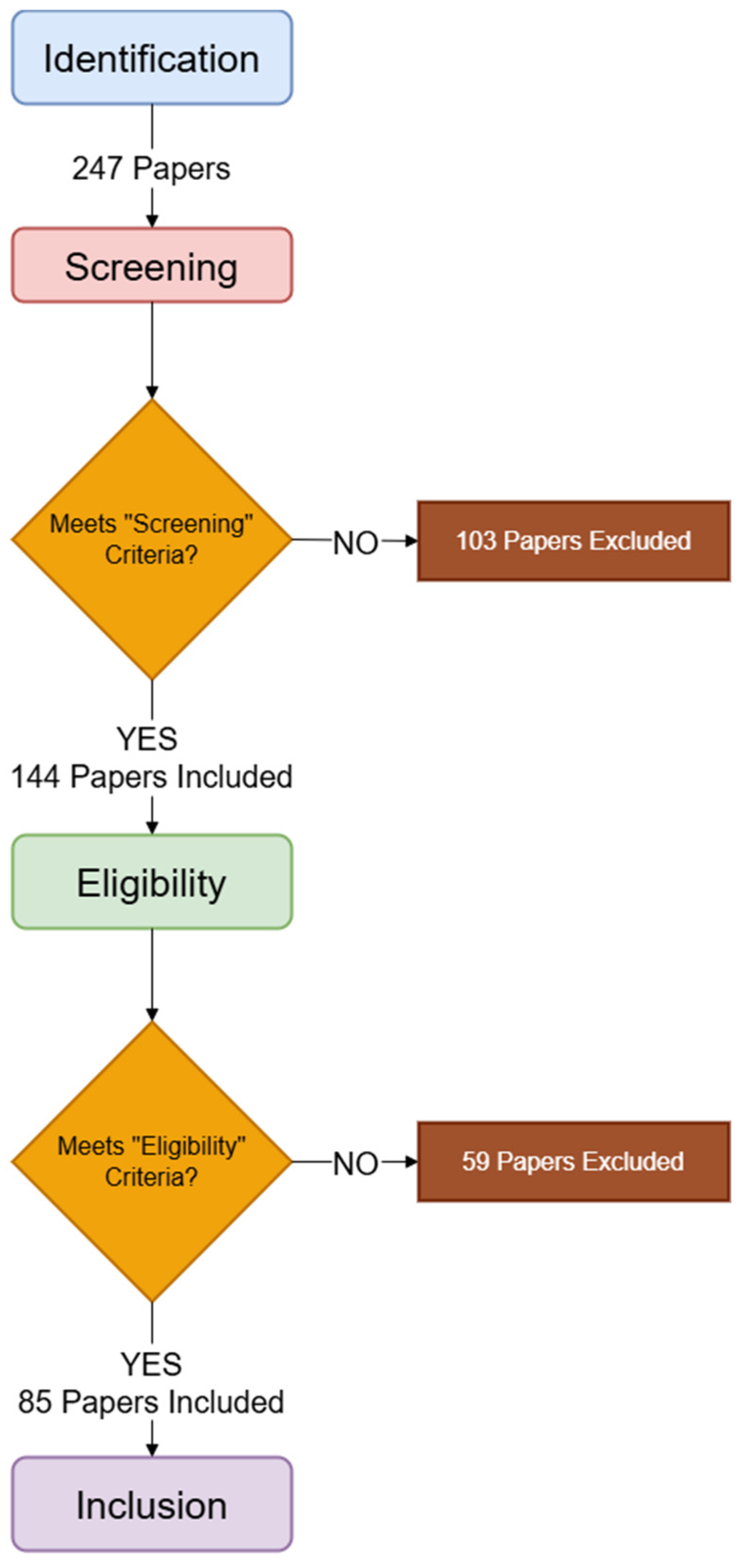

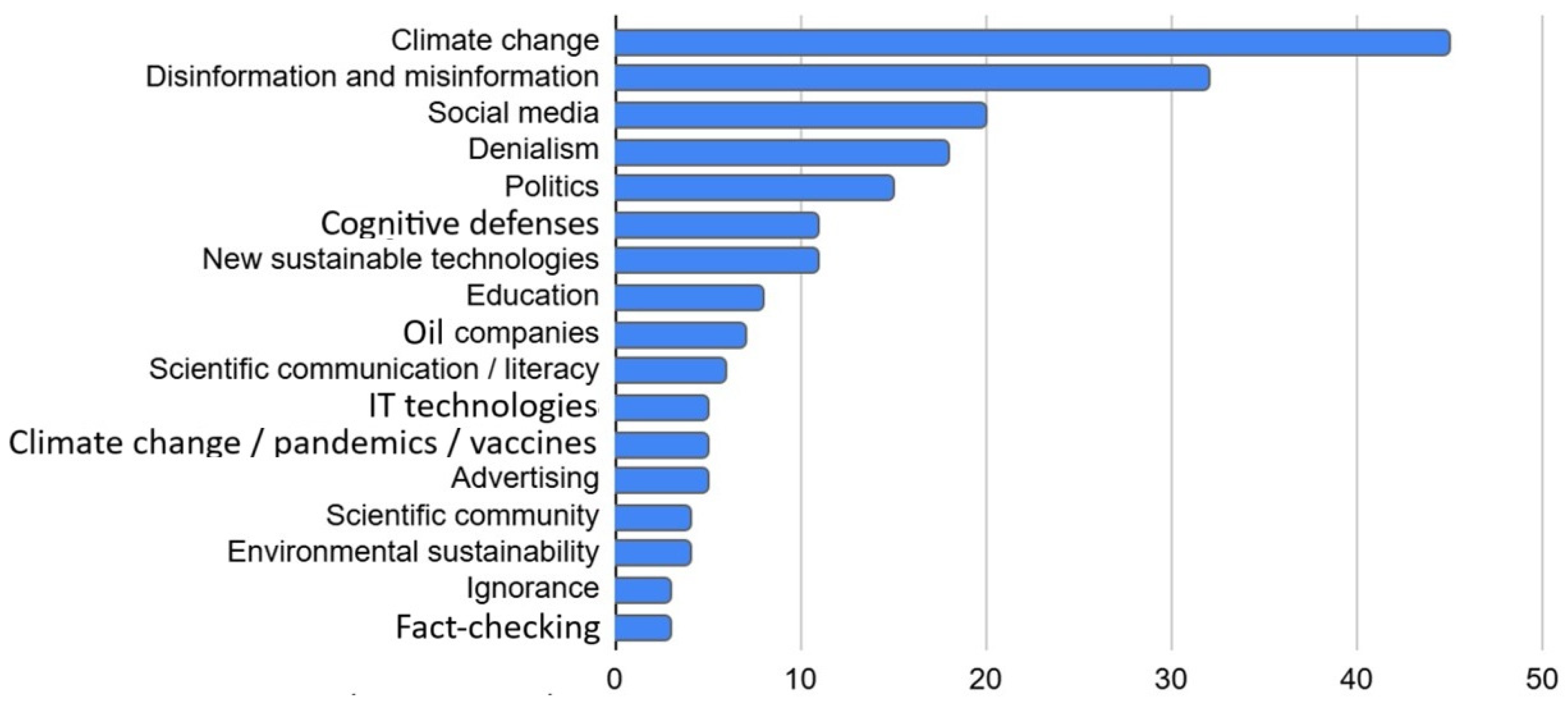
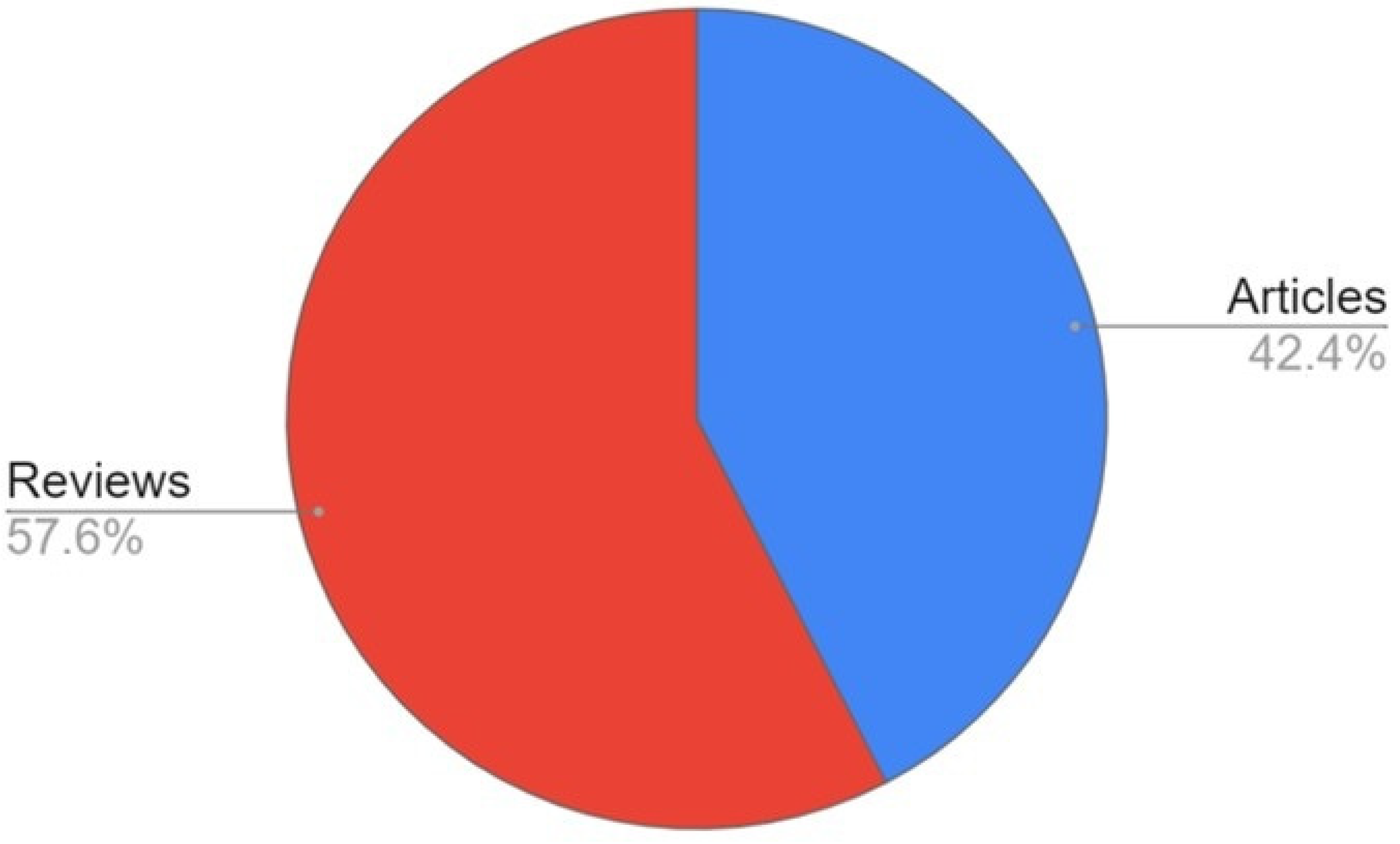
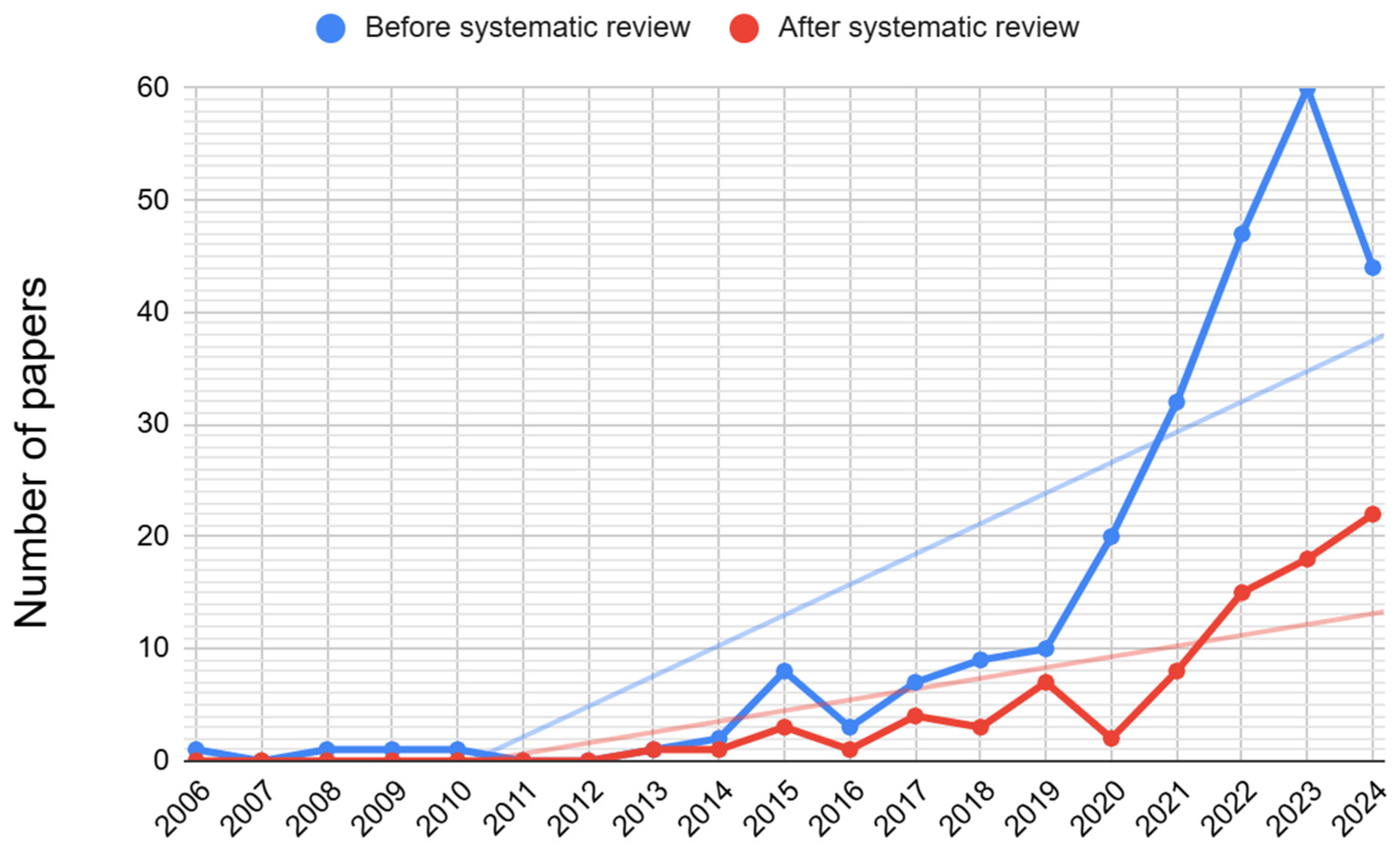
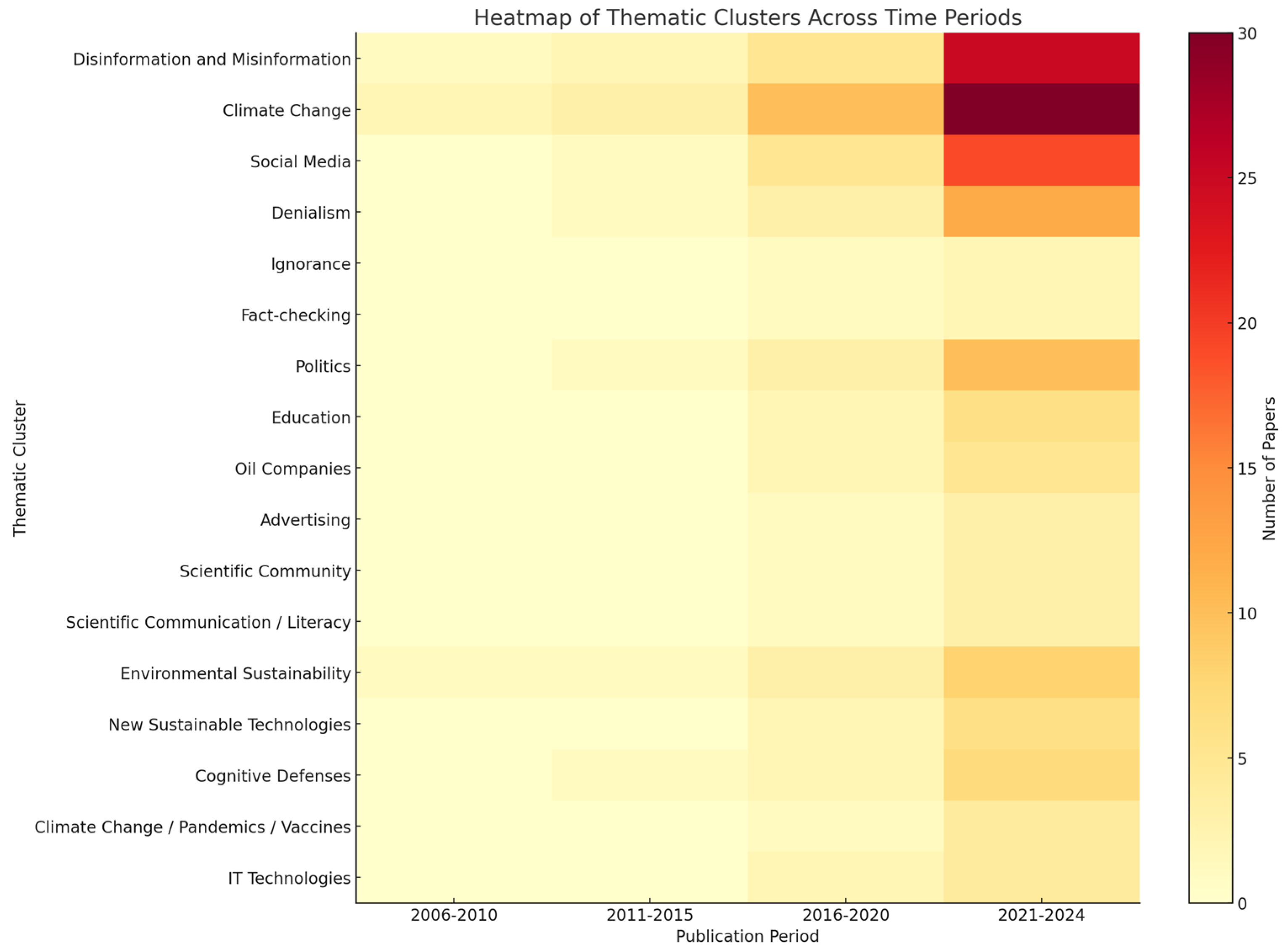
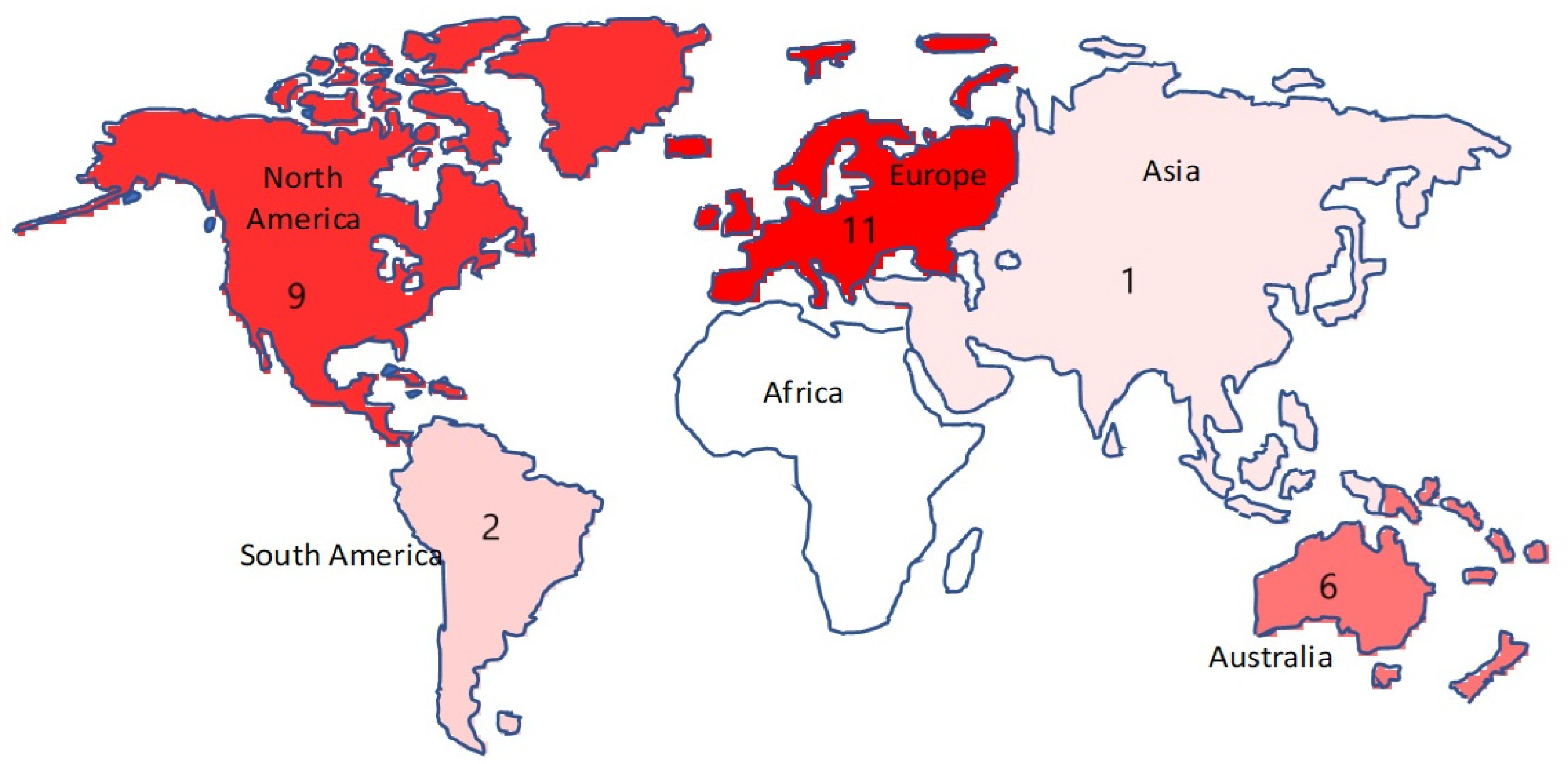

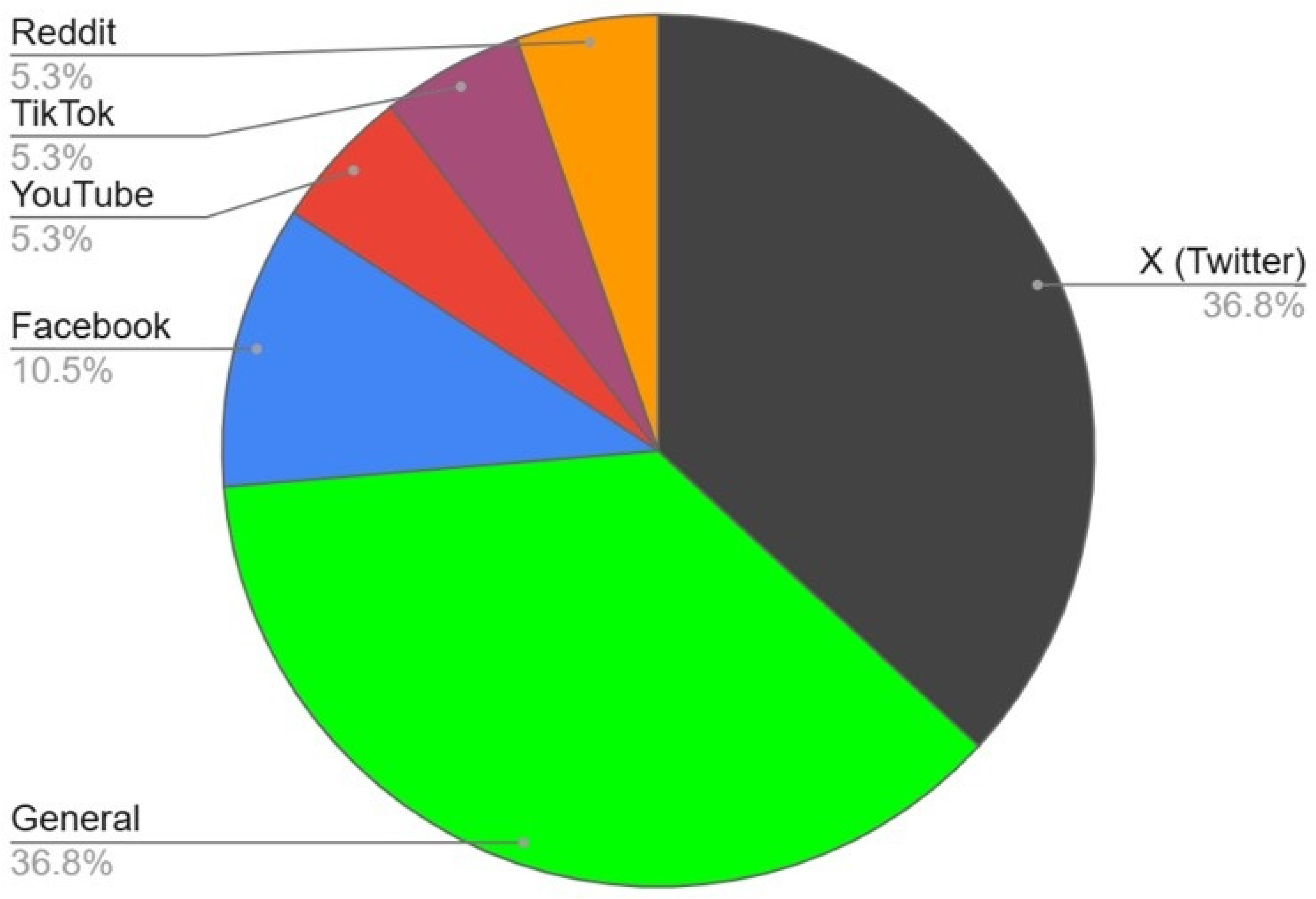
| ID | Cluster Name |
|---|---|
| 1 | Disinformation and misinformation |
| 2 | Climate change |
| 3 | Social media |
| 4 | Denialism |
| 5 | Ignorance |
| 6 | Fact-checking |
| 7 | Politics |
| 8 | Education |
| 9 | Oil companies |
| 10 | Advertising |
| 11 | Scientific community |
| 12 | Scientific communication/literacy |
| 13 | Environmental sustainability |
| 14 | New sustainable technologies |
| 15 | Cognitive defenses |
| 16 | Climate change/pandemics/vaccines |
| 17 | IT technologies |
| 18 | Articles (context category) |
| 19 | Nationality of populations studied (context category) |
| 20 | Students (context category) |
Disclaimer/Publisher’s Note: The statements, opinions and data contained in all publications are solely those of the individual author(s) and contributor(s) and not of MDPI and/or the editor(s). MDPI and/or the editor(s) disclaim responsibility for any injury to people or property resulting from any ideas, methods, instructions or products referred to in the content. |
© 2025 by the authors. Licensee MDPI, Basel, Switzerland. This article is an open access article distributed under the terms and conditions of the Creative Commons Attribution (CC BY) license (https://creativecommons.org/licenses/by/4.0/).
Share and Cite
Tomassi, A.; Falegnami, A.; Romano, E. Disinformation in the Digital Age: Climate Change, Media Dynamics, and Strategies for Resilience. Publications 2025, 13, 24. https://doi.org/10.3390/publications13020024
Tomassi A, Falegnami A, Romano E. Disinformation in the Digital Age: Climate Change, Media Dynamics, and Strategies for Resilience. Publications. 2025; 13(2):24. https://doi.org/10.3390/publications13020024
Chicago/Turabian StyleTomassi, Andrea, Andrea Falegnami, and Elpidio Romano. 2025. "Disinformation in the Digital Age: Climate Change, Media Dynamics, and Strategies for Resilience" Publications 13, no. 2: 24. https://doi.org/10.3390/publications13020024
APA StyleTomassi, A., Falegnami, A., & Romano, E. (2025). Disinformation in the Digital Age: Climate Change, Media Dynamics, and Strategies for Resilience. Publications, 13(2), 24. https://doi.org/10.3390/publications13020024








